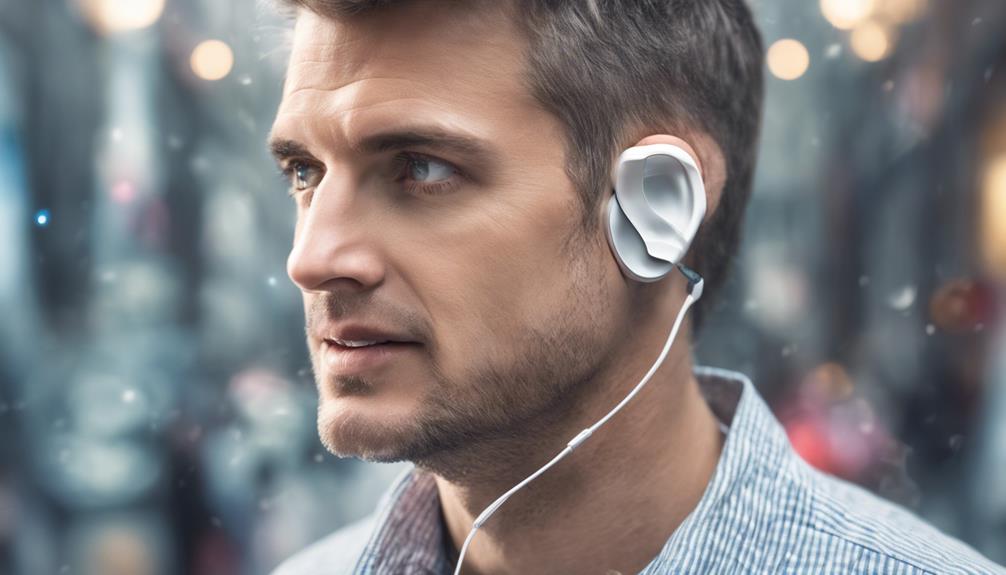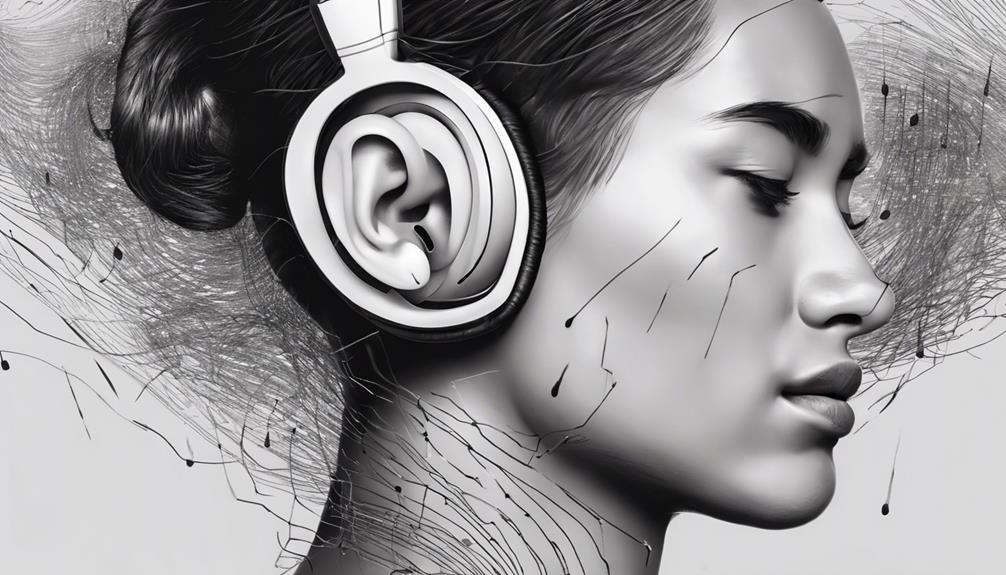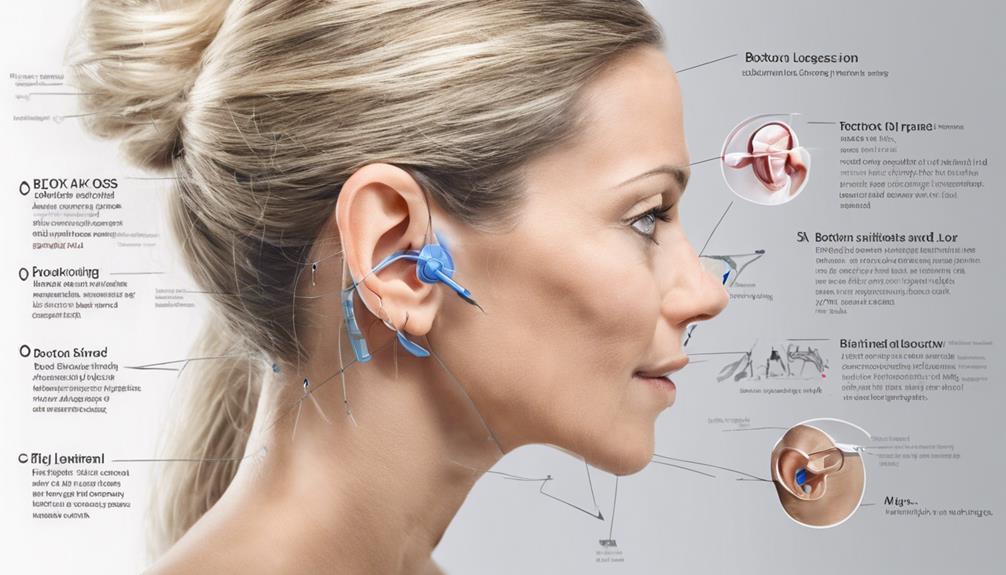Exploring the world of Bluetooth hearing aids and their potential impacts on our hearing uncovers that while they offer advantages, there may be drawbacks to consider. While the idea of improving our lives with wireless technology is appealing, it is crucial to examine the hidden risks.
What if I told you that the very devices designed to assist with hearing could, in fact, contribute to hearing loss? Let's unravel the complexities of this issue and uncover how Bluetooth technology might be affecting our auditory health.
Key Takeaways
- Prolonged high volume Bluetooth use can damage inner ear hair cells.
- Excessive volume settings in Bluetooth aids may cause noise-induced hearing loss.
- Monitoring volume levels and usage duration is crucial for preventing hearing impairment.
- Properly fitted Bluetooth hearing aids reduce the risk of ear damage.

Hearing Aids for Seniors, Rechargeable Hearing Aids with Bluetooth, Hearing Amplifier for the Hearing Loss, Hearing Your Voice
Easy to Use: Our hearing aids feature a 2-in-1 design with built-in Bluetooth functionality, making it easy to…
As an affiliate, we earn on qualifying purchases.
As an affiliate, we earn on qualifying purchases.
The Impact of Bluetooth Signals on Ears
Indefinitely, Bluetooth signals emitted by hearing aids, when set at safe power levels, don't directly cause hearing loss. Modern Bluetooth hearing aids are designed to operate within specific power thresholds that are considered safe for the ear. However, it's crucial to understand that prolonged exposure to high volume levels through Bluetooth devices can contribute to potential hearing damage over time.
To safeguard hearing health, users must exercise caution regarding the volume levels of their Bluetooth hearing aids. It's advisable to keep the volume at a comfortable level and avoid excessively loud noises that could lead to hearing impairment. Additionally, ensuring that Bluetooth hearing aids are properly fitted can help optimize sound delivery while minimizing the risk of harm to the ears.
Regular monitoring of volume levels and periodic hearing assessments are essential practices for individuals utilizing Bluetooth hearing aids. By staying vigilant and proactive in monitoring their hearing health, users can mitigate the risks associated with prolonged Bluetooth device usage.

Audien Atom One OTC Hearing Aids – Wireless, Rechargeable, and Comfortable | Clear Sound in a Small, Discreet Design for Seniors & Adults with Hearing Loss
Hear What Matters Most: Hearing isn’t one-size-fits-all. That’s why our adjustable frequency system lets you personalize your sound…
As an affiliate, we earn on qualifying purchases.
As an affiliate, we earn on qualifying purchases.
Potential Hearing Damage From Bluetooth
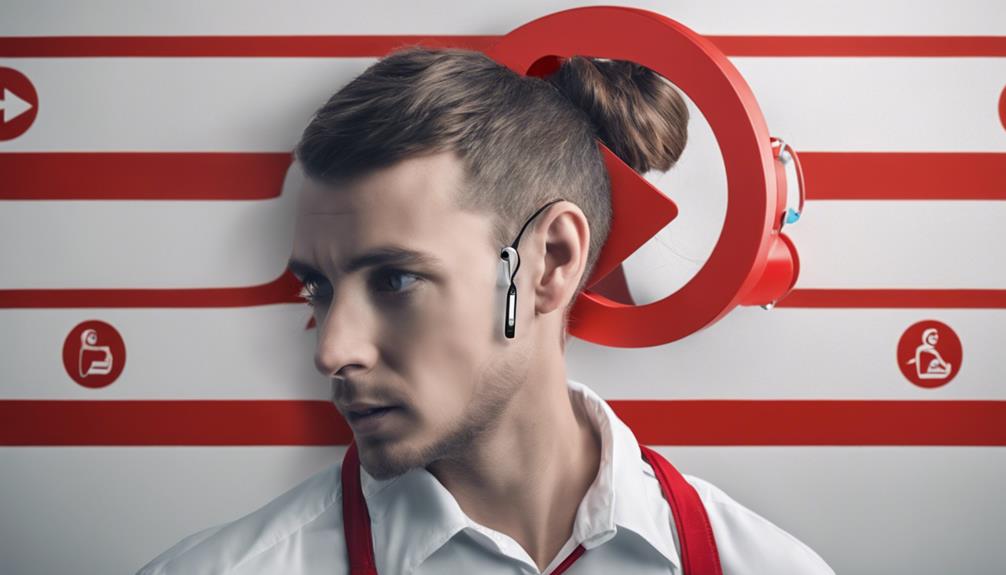
Bluetooth hearing aids have the potential to cause hearing damage, particularly when used at high volume levels for extended periods. Prolonged exposure to elevated volume settings can lead to hearing loss as it may damage the delicate hair cells in the inner ear. The excessive use of Bluetooth hearing aids at maximum volume can result in noise-induced hearing loss over time.
Individuals who use Bluetooth hearing aids frequently in noisy environments are at a higher risk of experiencing hearing damage due to the increased exposure to loud sounds. To mitigate the risk of hearing loss, it's essential to monitor volume levels regularly and take breaks from using Bluetooth hearing aids.
Adhering to these practices can help prevent potential hearing damage associated with the prolonged use of Bluetooth hearing aids at high volume levels, thus preserving the individual's auditory health in the long term.
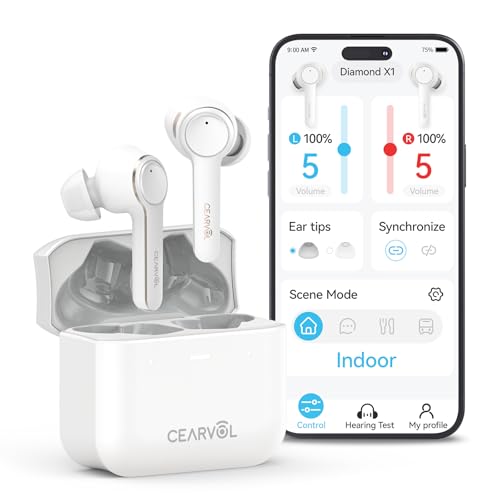
Cearvol Diamond X1 OTC Hearing Aids with Bluetooth Rechargeable App Control Noise Reduction Long Battery Life Comfort Fit for Mild to Moderate Hearing Loss, White
Seamless connectivity: Connect to your Android or iOS device via Bluetooth 5.3 for streaming audio and taking calls…
As an affiliate, we earn on qualifying purchases.
As an affiliate, we earn on qualifying purchases.
Bluetooth Hearing Aid Exposure Risks
While Bluetooth hearing aids emit low levels of non-ionizing radiation, studies haven't indicated a direct link between this radiation exposure and hearing loss. When considering the risk of developing hearing loss due to Bluetooth hearing aid exposure, it's crucial to rely on scientific evidence and expert opinions.
Here are some key points to consider:
- Consult with a hearing care provider to assess individual risks based on specific health conditions and device usage patterns.
- Regular monitoring of hearing health is essential to detect any changes that may occur over time.
- Understanding the technology behind Bluetooth in hearing aids can help users make informed decisions about their usage.
- Adhering to recommended guidelines for device usage can minimize any potential risks associated with Bluetooth exposure.
- Collaborating with healthcare professionals can provide personalized guidance on mitigating any risks of developing hearing issues related to Bluetooth technology.

Audien Atom X Hearing Aid Device for Seniors & Adults with Hearing Loss – OTC Bluetooth Hearing Aids w/Charging Case, 48+ Hour Battery Life – Easy Touchscreen Control, Comfortable & Discreet Design
ADVANCED LARGE CLEAR TOUCHSCREEN CONTROL – The Atom X is more than just a hearing aid, it’s an…
As an affiliate, we earn on qualifying purchases.
As an affiliate, we earn on qualifying purchases.
Mechanisms of Bluetooth-Induced Hearing Loss
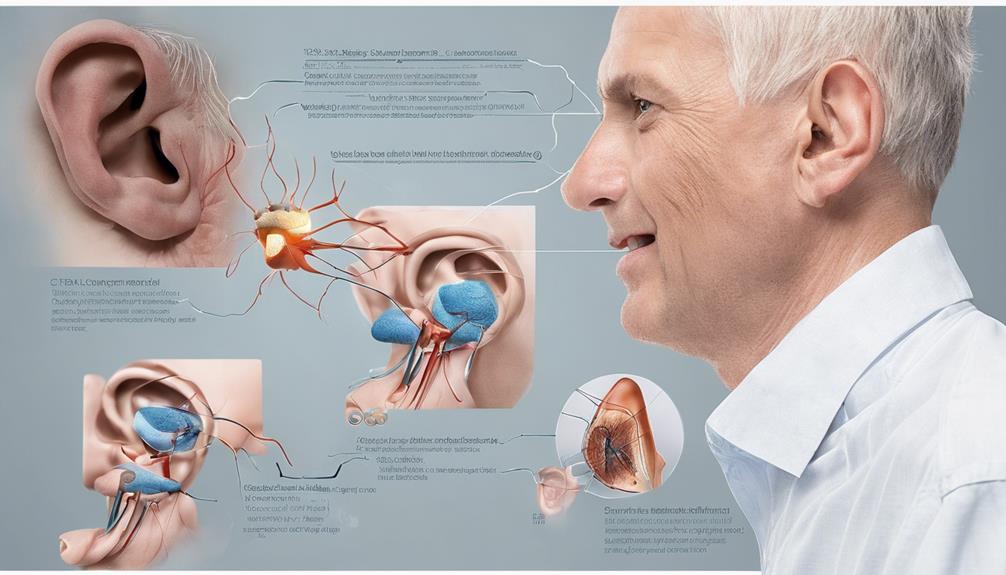
Regular exposure to high decibel levels from audio streaming through Bluetooth hearing aids can lead to mechanisms of hearing loss, particularly damage to the delicate hair cells in the inner ear. Bluetooth-induced hearing loss occurs when the prolonged and intense use of Bluetooth technology at high volumes damages these crucial sensory cells responsible for transmitting sound signals to the brain. The continuous transmission of audio signals via Bluetooth can overwhelm these hair cells, causing them to fatigue and eventually deteriorate, resulting in hearing impairment over time.
Monitoring the duration and intensity of Bluetooth audio streaming through hearing aids is critical in preventing Bluetooth-induced hearing loss. By being mindful of the volume levels and the length of time spent using Bluetooth hearing aids, individuals can mitigate the risks associated with auditory damage. Proper management and control of these factors are essential for preserving auditory health and minimizing the potential for long-term hearing loss due to Bluetooth technology.
Mitigating Bluetooth Hearing Aid Risks
To mitigate potential risks associated with the prolonged use of Bluetooth hearing aids, it's essential to implement strategies that focus on limiting exposure and optimizing device performance.
- Limit Usage Time: Restrict the daily use of Bluetooth hearing aids to reduce continuous exposure.
- Adjust Volume Levels: Keep volume settings at a moderate level to prevent auditory damage.
- Regular Maintenance: Ensure proper fit and function of Bluetooth hearing aids through routine checks.
- Professional Guidance: Seek regular consultations with professionals for adjustments and monitoring.
- Consider Alternatives: Explore hearing aid technologies like noise-cancelling features for a safer listening experience.
Frequently Asked Questions
Can Bluetooth Hearing Aids Cause Hearing Loss?
Yes, Bluetooth hearing aids can cause hearing loss. Prolonged exposure to high volume levels from these devices can damage delicate inner ear structures over time.
Incorrect fitting or calibration may lead to over-amplification, posing a risk for hearing damage. Regular volume monitoring and professional adjustments are crucial for preventing such issues.
Adhering to recommended guidelines and consulting audiologists for proper usage of Bluetooth hearing aids is essential in maintaining hearing health.
Do Bluetooth Hearing Aids Affect the Brain?
We've delved into the impact of Bluetooth hearing aids on the brain's functioning. Research has yet to definitively link Bluetooth technology to direct brain effects.
Concerns mainly revolve around potential non-ionizing radiation exposure. Ongoing studies aim to gauge Bluetooth's influence on brain health.
Current research predominantly focuses on broader health implications of Bluetooth radiation. However, further investigations are crucial to pinpoint any specific effects of Bluetooth hearing aids on brain activity.
Are Bluetooth Hearing Aids Better Than Regular Hearing Aids?
Bluetooth hearing aids offer enhanced functionality through wireless connectivity, audio streaming, and advanced features like remote control. Compared to regular hearing aids, Bluetooth-enabled devices provide increased versatility and convenience.
The technology in Bluetooth hearing aids can potentially improve the quality of life for individuals with hearing loss. These benefits make Bluetooth hearing aids a preferred choice for many users seeking improved auditory experiences.
Can Wearing Hearing Aids Cause Hearing Loss?
Yes, wearing hearing aids can potentially lead to hearing loss if not properly managed. Studies show that prolonged use of incorrectly fitted or over-amplified hearing aids can harm inner ear structures, resulting in deterioration of hearing abilities.
Regular monitoring by audiologists and adherence to guidelines for usage and maintenance are crucial in preventing such risks. It's essential to prioritize proper fitting and volume adjustments to safeguard against hearing damage when using hearing aids.
Conclusion
In conclusion, the correlation between Bluetooth hearing aids and potential hearing loss warrants careful consideration.
While the risks of non-ionizing radiation exposure are still being studied, it's important to minimize prolonged exposure to Bluetooth signals.
By selecting devices with lower power classes and limiting usage, individuals can mitigate the risk of auditory disorders.
Remember, responsible use of Bluetooth technology is key to safeguarding our hearing health.

